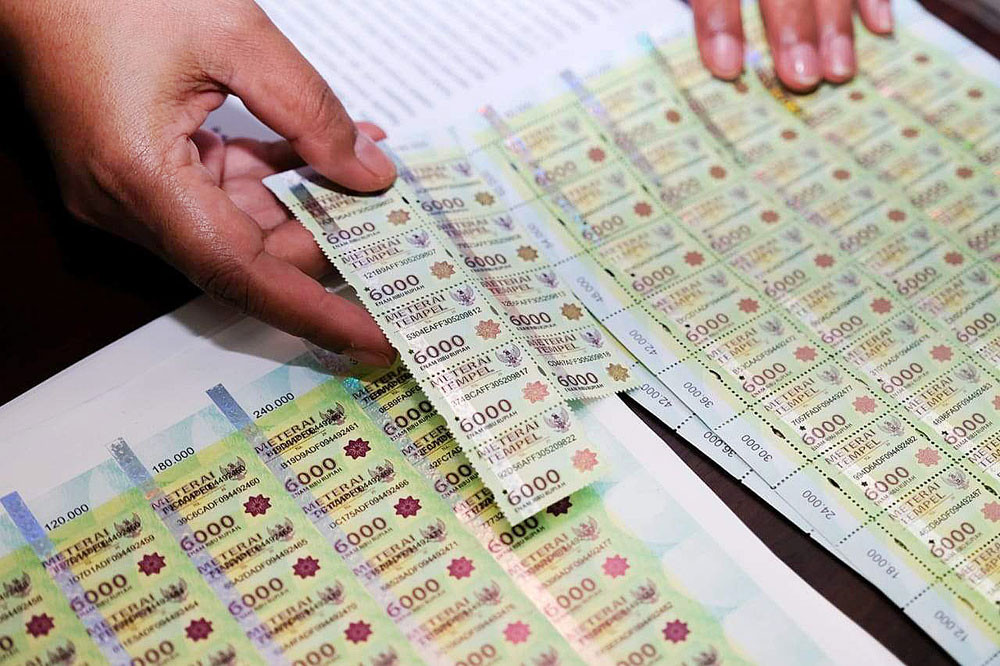Popular Reads
Top Results
Can't find what you're looking for?
View all search resultsPopular Reads
Top Results
Can't find what you're looking for?
View all search resultsGovt eyes $810m from stamp duty hike taking effect in 2021
Change text size
Gift Premium Articles
to Anyone
 Spot the difference: The Jakarta Police and the Finance Ministry’s Directorate General of Taxation have uncovered a syndicate producing and selling fake stamps. The nationwide distribution of the forged stamps caused state losses estimated at Rp 30 billion (US$2.1 million). (Courtesy of Finance Ministry’s Directorate General of Taxation/-)
Spot the difference: The Jakarta Police and the Finance Ministry’s Directorate General of Taxation have uncovered a syndicate producing and selling fake stamps. The nationwide distribution of the forged stamps caused state losses estimated at Rp 30 billion (US$2.1 million). (Courtesy of Finance Ministry’s Directorate General of Taxation/-)
T
he government is looking to raise around Rp 12.1 trillion (US$810 million) in revenue from stamp duty as the House of Representatives passed a law on Tuesday to increase the stamp duty to Rp 10,000 for business document deals starting next year.
The new law replaced Law No. 3/1985, which was deemed outdated and unable to cope with technological developments, Tax Office chief Suryo Utomo said.
Suryo added that the new law was also necessary to boost tax collection, as the country grappled with hefty tabs to boost the economy impacted by the COVID-19 crisis.
“We are preparing the transition from the current stamp duty to the new one, while also preparing the digital stamp, so that it could be implemented soon,” he told reporters in a press briefing on Wednesday.
The higher stamp duty will take effect early next year for all business documents.
The new policy will change the current law, which adopts a two-tariff system, namely a Rp 3,000 stamp duty for documents with deals worth between Rp 250,000 and Rp 1 million and Rp 6,000 for documents with deals worth more than Rp 1 million.
As part of the transition, the government plans to still allow businesses to pay the lower stamp duties until the end of next year. However, the two would now need to be combined in one business document, Suryo went on to say.
In a transition phase until the end of next year, the government would allow businesses to use the old stamps in a combination of the Rp 3,000 stamp and the Rp 6,000 stamp on the same document, Suryo went on to say.
The government is looking to raise Rp 12.4 trillion in the “other tax revenue” category, as stated in the 2021 State Budget Law, which would mark an increase of nearly Rp 5 trillion from this year’s target, following the passing of the Stamp Duty Law.
Read also: Govt, House pass Indonesia’s 2021 state budget: What you need to know
The government plans to collect Rp 1.74 quadrillion in overall revenue next year, which includes Rp 1.44 quadrillion in tax revenue, as it plans to spend Rp 2.75 quadrillion to accelerate economic recovery and push for structural reforms amid the coronavirus pandemic.
On that basis, the state budget deficit is expected to reach Rp 1 quadrillion, or 5.7 percent of the GDP, lower than the estimated 6.34 percent of GDP this year, as the government will slightly cut spending while at the same time slightly increasing revenue from taxes.
Given recent technological advances, business documents do not always need to be signed on paper. Instead, many digital enterprises produce digital documents on their websites or mobile applications so that customers can simply sign them electronically with the use of a digital signature without having to meet with company representatives.
Despite the fact that some digital documents involve money, most do not include the stamp as there is currently no digital stamp available.
Although revenue from stamp duty has risen in the last 10 years, its contribution shrank to only 0.09 percent of tax revenue in 2019 as the tariff remained stagnant since 2000 while the GDP grew, Center for Indonesia Taxation Analysis (CITA) deputy director Ruben Hutabarat.
“Thus, the increase in the stamp duty is appropriate and urgent,” he told The Jakarta Post. “We are hoping that revenue from the stamp duty could return to 0.2 percent of all tax revenue.”









